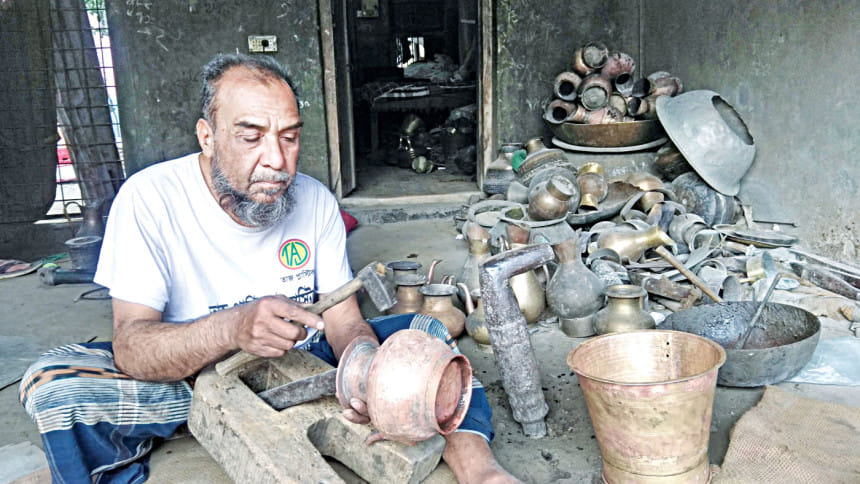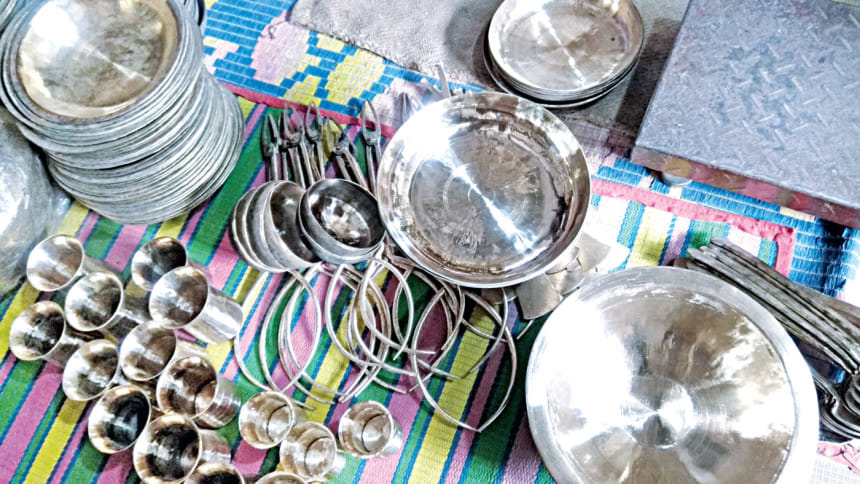Metalworkers hit by rising production costs

The traditional pewter and brass metalwork industry in Chapainawabganj has been struggling to bear the burden of increased production costs for the past four months now, according to industry insiders.
The steep hike in raw material prices has restricted the industry's growth, they said.
Pewter is a malleable metal alloy consisting of about 91 per cent tin, 7.5 per cent antimony, and 1.5 per cent copper.
Brass is a mixture of copper and zinc.

Around 25 years ago, roughly 1,000 families in the region were engaged in the centuries-old profession of making household articles, such as plates and cups, from pewter and brass.
At the time, the industry made a name for itself though quality work.
Now though, just some 100 families in the Azaipur, Arambagh, Ramkrishtopur, Bat Tala and Shankarbati areas of Chapainawabganj are still living off of their ancestral craft.
And with the recent spike in raw material costs, their numbers are dwindling fast.
Raw material prices are at a level where sales can hardly cover production costs.
Besides, some people are importing pewter and brass products from India to sell them locally at comparatively cheaper prices, which has a negative effect on the domestic industry.
"I only work two or three days a week due to the lack of raw materials but just a few months back, I was working six days a week," said Mohammad Sabbir, a day labourer of Azaipur.
"I earn only Tk 350 to Tk 400 for each day's work," he added.
Nurul Islam, owner of a casting metal factory in the same area, said business has been deteriorating day by day not just because of higher raw material costs, but also the comparatively cheaper Indian products entering Bangladesh.
Echoing the same, Shafiqul Islam, a pewter factory owner in Ramkrishtopur, said he has been crafting pewter and brass products since he was 10 years old as it is a part of his heritage.
Business was going well but the sudden hike in raw material prices and increased imports from India have plunged the industry into losses.
The high price of requisite metals and a huge increase in the price of raw materials are the two main threats to the industry, Islam said.
There are over 300 shops selling the metal items, including 125 wholesalers, said Rabiul Islam Babu, president of Kansa-Pitol Babosayi Samity, an association of metalworkers in the district.
They used to sell some 12,000 kilogrammes (kgs) of pewter products each month, which had a total market value of about Tk 2.64 crore.
In case of brass, they sold 5,000 kgs of products worth Tk 40 lakh, he said.
Now, they collectively sell only 6,000 kgs of pewter products each month and two to three thousands kilograms of brass.
Earlier, they sold pewter utensils at Tk 1,400 to Tk 2,000 per kg but now, they are selling for Tk 2,000 to Tk 2,400 per kg.
Similarly, brass metalwork sold for Tk 550 to Tk 750 per kg before but is now selling at about Tk 700 to TK 1,000 due to the increased raw material prices.
Likewise, copper utensils that were once valued at Tk 500 per kg now cost Tk 825 per kg.
Wholesalers and suppliers from around the country, including Dhaka, purchase these items from the district, Babu said.
But the higher raw material costs have left them unable to recover from low sales for the last four months in the face of increased prices.
"So, we cannot fulfil our target. Casting metal factories are mostly being run just twice or thrice a week, leaving owners and day labourers idle for the rest of the time. Earlier, we bought tin at Tk 2,100 to Tk 2,200 per kg but now, we buy it for Tk 4,200 per kg.
And since pewter and brass metal goods imported from India are also available in the market now, business is going badly, he added.
With this backdrop, Babu urged the concerned authority to stop imports from India in order to save the domestic industry.

 For all latest news, follow The Daily Star's Google News channel.
For all latest news, follow The Daily Star's Google News channel. 



Comments